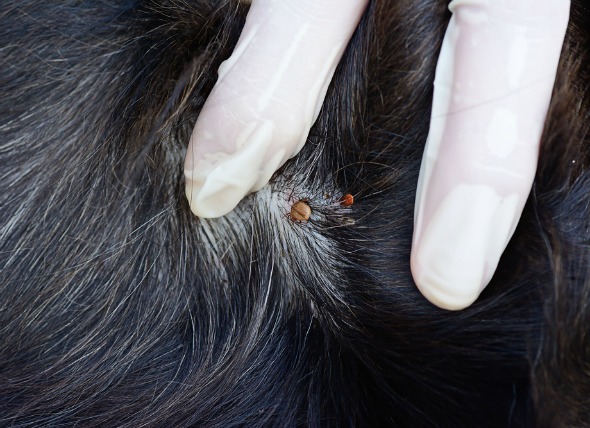

Rocky Mountain spotted fever is one of the most commonly known tick-borne diseases to affect dogs and humans. It belongs to a class of diseases known as Rickettsia; rod-shaped microorganisms that resemble bacteria, but which behave like viruses, reproducing only inside living cells. Rickettsia rickettsii -- the organism responsible for Rocky Mountain spotted fever -- lives parasitically in ticks and is transmitted by bite to vertebrate hosts.
Certain breeds are more likely to develop a severe reaction to the R. rickettsii organism than others; these include purebred dogs and German shepherds. The signs and symptoms of Rocky Mountain spotted fever vary according to the type of disease the dog has. Most dogs will develop a fever within five days of contracting Rickettsia rickettsii. Other symptoms include:
Tick-borne rickettsial disease is caused by the R. rickettsii microorganism. The organism is carried by ticks and transmitted through bite to a host animal. Most infections occur in the months from March through October.
You will need to give a thorough history of your pet's health, including a background history of symptoms, recent activities, and possible incidents that might have precipitated this condition. The history you provide may give your veterinarian clues as to which organs are being affected (e.g., heart, kidney).
Your veterinarian will make the diagnosis based on blood tests and skin biopsies from the affected areas, along with the symptoms that are presented. A heightened antibody count will show that an infection is present. Special stains can be used in a laboratory setting to confirm a diagnosis.
Rocky Mountain spotted fever is a serious ailment that may result in fatality if your dog is not cared for properly. Treatment usually involves admitting your pet to an in-patient health facility where a health care team can monitor your dog until it shows signs of improvement. Your pet will be given antibiotics, the type will be based on your pet’s age, and proper hydration and fluid balancing will be checked.
If your dog is found to have low red-blood cell counts, a condition known as anemia, or if there is a threat of developing a condition known as thrombocytopenia, where the platelets or substances in the blood become too low, a blood transfusion may be necessary to prevent these conditions from becoming life threatening.
Your veterinarian will also monitor the amount of fluid in the dog's brain to prevent edema, or excessive swelling of tissues in the brain, body, and lungs.
Along with the prescribed antibiotics, your dog may also require corticosteroid anti-inflammatory medications.
If you know your dog will be in an area that is tick infested, you will want to screen your pet for ticks and take precautions to prevent your pet from overexposure to ticks. Tick repellents and tick collars can be used, but checking your dog’s skin and hair for the presence of ticks is the most accurate way of preventing infection. Infection typically occurs after five hours.
You will need to wear latex gloves and remove any ticks you find on your pet by hand, taking extra care to remove the mouth part of the tick. Your veterinarian may recommend the use of dips and sprays to help prevent further tick infestation. The type of repellent you use will be based on your dog’s age and health status.
The prognosis for pets is usually good, provided you seek prompt and early care and treatment. If you seek help within the first few hours of infection, your pet will likely survive with no long-term consequences.
If you do not take prompt action, however, it is likely that your pet may suffer long-term consequences or even death. This could occur within days or even hours. Without proper treatment, the effects on the central nervous system can be devastating.
 Tick Paralysis in Dogs
Tick Bite Paralysis in Dogs
Ticks act as carriers
Tick Paralysis in Dogs
Tick Bite Paralysis in Dogs
Ticks act as carriers
 Stomach Worm Infection (Physalopterosis) in Dogs
Physalopterosis in Dogs
Physalopterosis is an inf
Stomach Worm Infection (Physalopterosis) in Dogs
Physalopterosis in Dogs
Physalopterosis is an inf
 Shock Due to Decrease in Circulation in Dogs
Hypovolemic Shock in Dogs
A dog can go into shock
Shock Due to Decrease in Circulation in Dogs
Hypovolemic Shock in Dogs
A dog can go into shock
 Mouth Inflammation and Ulcers (Chronic) in Dogs
Oral Ulceration and Chronic Ulcerative Paradental Stomat
Mouth Inflammation and Ulcers (Chronic) in Dogs
Oral Ulceration and Chronic Ulcerative Paradental Stomat
 Joint Cartilage Erosion in Dogs
Erosive, Immune-Mediated Polyarthritis in Dogs
Er
Joint Cartilage Erosion in Dogs
Erosive, Immune-Mediated Polyarthritis in Dogs
Er
Copyright © 2005-2016 Pet Information All Rights Reserved
Contact us: www162date@outlook.com